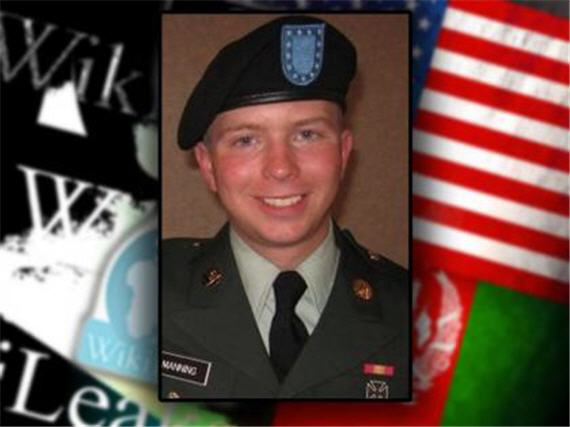Judge In Bradley Manning Trial Allows Most Serious Charge To Go Forward
While the nation’s attention has been focused on the courtroom in Florida where George Zimmerman was being tried in connection with the death of Trayvon Martin, there was another trial going on. In a military courtroom at Fort Meade, Maryland, Pfc. Bradley Manning has been on trial in connection with the information that he released to Wikileaks while stationed at a U.S. base in Iraq. The trial hasn’t gathered nearly as much attention as the Zimmerman trial, likely due in no small part to the fact that there are no cameras in the courtroom. In any event, the defense concluded its case last week and the trial is nearing the decision stage, which today included a decision by the presiding judge that the most serious charge against Manning will not be dismissed:
The military judge in the trial of Pfc. Bradley Manning decided on Thursday not to drop a charge accusing Private Manning of “aiding the enemy.” If he is found guilty of the charge, he faces a possible life sentence in military custody with no chance of parole.
In February, Private Manning, a 25-year-old Army intelligence analyst, admitted to having leaked hundreds of thousands of classified documents to WikiLeaks. He denied that he was guilty of 12 counts, including aiding the enemy, but pleaded guilty to 10 lesser offenses that could have put him in jail for up to 20 years.
The government has said it will not pursue the death penalty against Private Manning.
The decision of the judge, Col. Denise Lind, centered on the prosecution’s evidence that some of the classified documents Private Manning admitted giving to WikiLeaks were posted on the Internet and later reached Osama bin Laden.
The judge heard a request from the defense on Monday to drop the charge. David E. Coombs, the lead defense lawyer, argued that Private Manning did not have “actual knowledge” that by leaking the documents to WikiLeaks he was aiding the enemy.
In the past, the government had argued that through his extensive training, Private Manning should have known that the information could end up with groups that wanted to harm American military personnel. But the government acknowledged Monday that “should have known” was not enough to define “actual knowledge.”
If Manning is convicted on this charge, one can expect it to be a major point of contention on appeal. However, for the time being at least, this is a major defeat for the defense which was clearly hoping to avoid having to deal with the possibility of a conviction on a charge that could keep Manning in a military prison for the rest of his life.


Having served in the Air Force for 8 years and holding the Highest TOP Secret Clearances. I feel that this individual was, either, not properly trained, or hisBackground Checks were not performed adequally. He should have known
the information he had access to, could aid the enemy if released.
It was either an EGO attention getting thing, or he is a Far Leftest.
Today individuals in Government positions leak information that puts
our troops, and country in Danger. Why are they not punished.
I don’t know if he should get a Life Sentence for his actions.
That is up to the Military Court.
@APL: “He should have known the information he had access to, could aid the enemy if released.”
That sounds right, but the judge’s ruling is that “should have known” is insufficient; the case is going forward on the most serious charge with the understanding that the government will be expected to prove that Manning had ”actual knowledge” of himself ”actually giving intelligence to the enemy” through ”a third party, an intermediary or in some other indirect way.” Manning strike me as a naive fool, not someone who wanted to help al-Qaeda.
The difference between “should have known” and “actually knew” appears to be the difference between 20 years and life.
By that standard, Dick Cheney is certainly open to prosecution for aiding the enemy by outing a clandestine CIA employee.
@PD Shaw:
20 years for the minor league charges to which he has already tendered a guilty plea. Even absent the aiding charge, he’s facing a laundry list of more serious charges with the potential for an additional 154 years. Realistically, he’ll be convicted on most of those, IMO.
So it’s a moot point. Life as an imposed sentence or life as a de facto sentence. The outcome from a practical perspective will largely remain the same.
Just before they put him away forever, they should reintroduce the ritual of drumming him out. A publicly televised display of ripping off his service insignias, painting a yellow stripe down his back and frog-marching him off in shackles would do nicely.